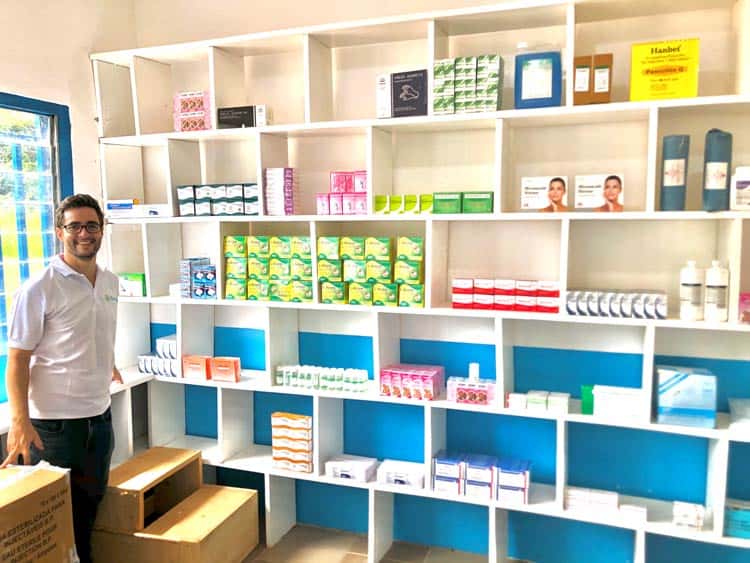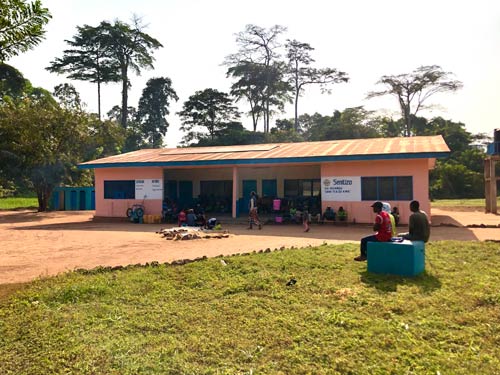Ted Hooley brings a rather simple philosophy to his work.
But it’s one that has sustained the 2010 Saint John’s University graduate as he has taken on the daunting task of overseeing the construction and operation of a modern, locally-staffed health clinic in a remote and rural area of the Central African Republic.
The Stillwater native is the president and CEO of Senitizo, the humanitarian nonprofit he founded in 2017. The clinic marks the first project the organization has undertaken. In spite of a global pandemic and a period of civil unrest, he and his team managed to build, staff and open it near Bouchia, a village of around 5,000 people located 70 miles southwest of the capital city of Bangui.
“People ask me why I wanted to start off a new entity like this,” said Hooley, who majored in economics and Hispanic studies at SJU. “It’s really about finding a job that gives you more energy than you put into it. If you’re going full-speed and not getting something out of the work you’re doing, you’ll just burn out.
“What I really like is being out in the community and seeing the impact first-hand. I can walk around the village and talk to people. That helps recharge my batteries.”
The clinic is located in a region that has not had access to modern medicine. Getting it open would not have been easy regardless. But it was made more complicated by the onset of the COVID-19 pandemic, which hit in March of 2020 – just weeks after Hooley had made one of his return trips to the U.S. That prevented him from returning to the Central African Republic for several months.
Even when he finally got back that fall, an outbreak of civil conflict kept him stuck in Bangui for a time. Nevertheless, the clinic – which employs a full-time staff of seven, including a doctor, a pharmacist and nurses (all from the Central African Republic) — began providing care in May of 2021 and ramped up to full operations last December.
“We’re learning as we go,” said Hooley, who resides in Bangui but gets down to the clinic twice a month. “We’re finding new ways to engage with people. Our focus has been on marginalized groups, which unfortunately is a category that most people in CAR fall into. That’s the reason we wanted to start out in this rural area where they’ve not had access to medical care before. The medical care in Bangui isn’t great either. A lot of times, it’s too expensive. But we really wanted to go first to an area that had been totally untouched and totally neglected.”
Finding his calling
After graduating from SJU, Hooley completed a series of international internships before going to Georgetown for a Master’s in Global Human Development.
He then worked in Liberia, first with an emphasis in health finance, then assisting with the nation’s response to the Ebola crisis through a job with the International Medical Corps. That also brought him to neighboring Sierra Leone, and eventually drew his attention toward the Central African Republic, where he saw a need for a new and smaller-scale approach to humanitarian care.
“I was interested in trying to set up something with a new business model behind it because I wasn’t always happy with what I saw in some of the larger organizations,” Hooley said. “They do great work, but because of the bureaucracy that can arise, some of the money wasn’t always able to go to the best possible use. I told myself that if I was going to be over there, I wanted to make sure that any dollar I raised went directly to the people it was intended for.
“I also wanted to try and create something more sustainable. That’s one of the reasons we hire only local staff. I’m the only expat. Everyone else over there – our doctor, our nurses, our pharmacist and our administration – is Central African. So hopefully, we’re creating a lasting foundation.”
Founding Senitizo
Senitizo, which translates to “the health of the people” in Sango (the official language of the Central African Republic), has an all-volunteer board based in the U.S. Board members give of their time to make the operation work and Hooley returns twice a year to raise needed funds.
So far, donations have all been private. Though Hooley hopes a recent visit by the now former U.S. Ambassador to the Central African Republic, Lucy Tamlyn, might have laid the groundwork for future cooperation from the U.S. government.
“Our fundraising right now is smaller foundations and, of course, individual donors,” he said. “We have a lot of Johnnies and Bennies who donate on a yearly basis. I’ll go around and give talks when I’m back in the U.S. I just spoke to a Rotary club in Stillwater that has helped fund a lot of our medical equipment at the clinic.
“Cobbling together pieces is probably one of the most challenging parts. But we’re very careful not to bite off more than we can chew. You don’t want to be providing health services one month, then the next having to say ‘Sorry, we don’t have enough money for medicine.’ Again, our goal is to create something sustainable for the long-term.”
Up and running
Hooley said the clinic is already seeing around 50 people per day, mostly women and children, who come from a radius of around 40 miles in either direction across a region with little access to motorized vehicles.
“In one sense, that’s good because the people are very appreciative,” he said. “But on the other hand, it’s bad because that’s way too many people coming from way too far away. It just shows how strong the demand is for services like this.”
Hooley said the clinic recently purchased an ambulance, which will assist in getting to more areas where immediate medical attention is needed – including during childbirth. The Central African Republic consistently has one of the highest rates of maternal mortality in the world.
“Our goal is to get women in for prenatal consultations,” he said. “Then to develop relationships with community health workers, or even the tribal chiefs in these areas. So when the woman goes into labor, they can call us and we will send the ambulance to bring them to the clinic. Or, if complications arise, we can use the ambulance to get them to a hospital 30 miles to the north that we have a great cooperative relationship with.”
The future
Hooley hopes to one day open a second clinic in another area of the country. For now, though, the focus is on getting this one established and able to exist on its own.
“One thing that’s really important to us is being able to show people we’re in this for the long haul,” he said. “Not just the people we serve, but the people we work with in the Ministry of Health in the government there. We want people to know we’re serious about working with them to make the health care system in the country sustainable over the long term.”

Ted Hooley ’10

Photos courtesy of Ted Hooley.